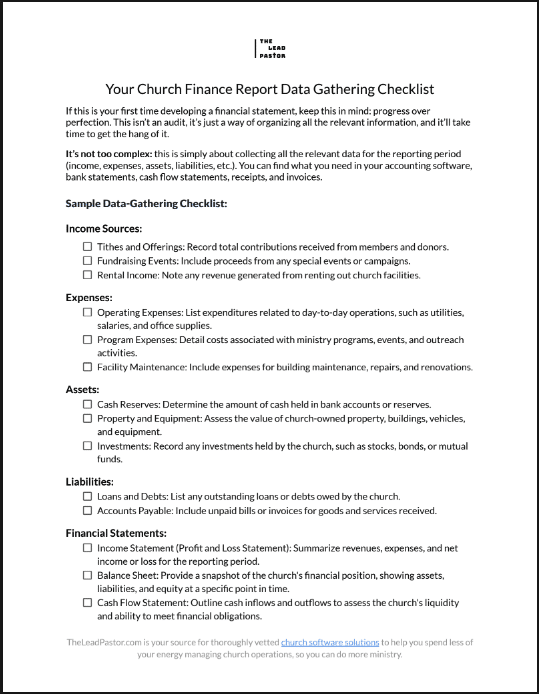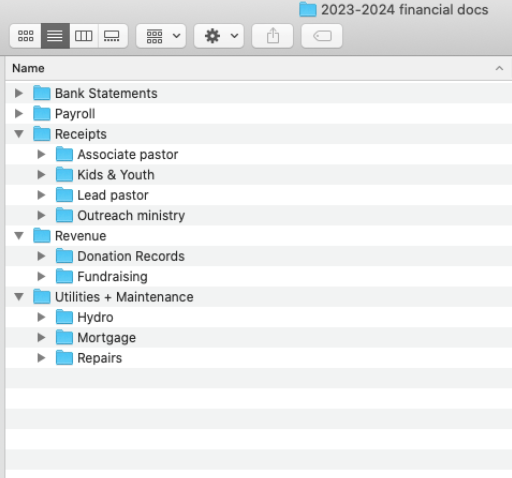 church finance report near a church window" width="792" height="446" />
church finance report near a church window" width="792" height="446" /> church finance report near a church window" width="792" height="446" />
church finance report near a church window" width="792" height="446" />
There’s nothing as thrilling as sitting down to work on your monthly church financial report. ugh, I can't even read that with a straight face. Fact is, if you're like me (and many other lead pastors), then the work of creating church finance reports just isn't in line with your natural giftings.
BUT: examining church balance sheets, checking the bookkeeping, calculating liabilities, and using church financial software is still an important part of church leadership.
I'm Joshua Gordon, and for over two decades, I've held various church leadership roles (paid and volunteer), including helping to plant New Life Fellowship in Cambridge, Ontario, Canada.
So, I'm going to break down everything you need to know to have a stress free church financial report. Along the way, we’ll give you some examples and checklists to help you get started. By following these tips, you’ll be able to generate church financial reports that are clear, transparent, and informative!
After all, when your church finances follow the pastoral vision and direction, then trust and financial accountability between your church and its members will grow.
Your people will have a greater willingness (and excitement) to support the church’s mission with their time, energy, and money.
I wrote this article with Jim Gordon, the senior pastor of Elora Road Christian Fellowship. Jim has been leading ERCF for 20+ years; in that time, he's seen it all - and understands the ins and outs of managing a church's financial health.
Church finance reports bring clarity and shine a light on your current financial circumstances. Even if what you see is discouraging, you and your leadership team will be equipped to plan for a better financial future .
Senior Pastor (Ontario, Canada)
A church financial report is simply a snapshot of your church’s current financial situation. It should paint a clear, accurate picture of the current financial status of your church. so it's not meant to be a church budget. It's not meant to be a forecast.
Finance reports like this are typically created monthly (but sometimes quarterly or annually, depending on the report's intended audience - more on that in a second.) When considering how often you need these created, consider the following:
All of these questions factor into this conversation.
2024's Top Church Finance SoftwareThis is an aggregated rating for this tool including ratings from Crozdesk users and ratings from other sites.
Visit Website QuickBooks OnlineThis is an aggregated rating for this tool including ratings from Crozdesk users and ratings from other sites.
Visit Website ChMeetingsThis is an aggregated rating for this tool including ratings from Crozdesk users and ratings from other sites.
Visit Website![]()
![]()
Typically, a church finance committee or board of directors takes the lead on this (often aided by church accounting software tools), as they are responsible for providing oversight and direction. Often, the treasurer will work alongside a bookkeeper or accountant (hire or outsource if necessary) to present the church report. If you don’t yet have a board or church finance committee in place, this is a great time to recruit a team of qualified volunteers.
Pastors, your role is also key, as Jim Gordon unpacks in more detail here:

Sign up for regular insights on how to pastor and lead better.
A church finance report, by giving a snapshot in time of your church's health, greatly supports your budgeting and planning efforts. You and your leadership team will be equipped to identify and respond to trends, manage your resources effectively, and manage and mitigate financial risks. Ultimately, church finance reports are real time feedback on your church's operational and administrative decisions.
Church finance reports are a big part of church record management. They make it much harder for financial problems to grow and develop out of sight. Issues are nipped in the bud. A church financial report provides transparency by detailing the sources of income and how funds are spent, ensuring accountability - not only to the congregation, but also to your church's board of directors, finance committee, etc.
Church financial report assists with compliance by ensuring adherence to legal and regulatory requirements governing financial transparency and reporting. Monthly reports (for example) show a track record of financial transactions and decisions, which can be helpful if your church is needing financing for a building, etc. Some regulatory bodies require regular reports as well (IRS or CRA) - though we recommend you follow-up with your accountant for specific advice on your situation.
*occasionally

Church finance reports may change in their scope and complexity, depending on who the report is for:
There are a handful of components that make up a church financial report. Each is a vital tool for both internal management and external stakeholders to understand the financial position of your church. Let’s break it down!
. summarizes the church's revenues and expenses over a specific period, typically detailing sources of income (e.g., donations, tithes, grants) and church expenses (e.g., salaries, utilities, equipment, maintenance).
..provides an overview of the church's assets, liabilities, and net assets (or equity) at a particular point in time. This helps assess the overall financial health.
. tracks the flow of cash into and out of the church during a specified period, providing insights into the financial health and operational efficiency.
. shows actual financial performance alongside the budgeted amounts, helping identify areas of over- or under-spending, and informing future budgeting decisions.
. provide additional context or explanations that may be needed. If facilities spending is substantially higher because the church building needed a new furnace this month, ensure that additional context is noted in the report.
Let’s go over exactly how to develop the report. If this is your first time developing a financial statement, keep this in mind: progress over perfection. This isn’t an audit, it’s just a way of organizing all the relevant information, and it’ll take time to get the hang of it.

Collect relevant data for the reporting period (income, expenses, assets, liabilities, etc.). You can find what you need in your accounting software (which offers a ton of benefits to your church), bank statements, cash flow statements, receipts, and invoices.
Once you’ve gathered the data, we recommend organizing each report’s source data into well-labeled (include dates!) folders or digital files, grouped by source (i.e.: bank statements, donation records, expense receipts, payroll, vendors, etc.). Use subfolders as necessary. here's a quick screengrab of a sample:

List all revenue, deduct all expenses and calculate net income or loss for the reporting period (i.e., the month, quarter, or whole year). Your church accounting or bookkeeping software should be able to generate this report. If not, consider switching to one that DOES - but in the meantime, Google offers a sample P&L worksheet.
Your church's balance sheet simply reports what is owned (assets), and what is owed (liabilities). When you combine the two, you get your net assets. (As before, your church's accounting program should be able to generate this for you. If not - change it! Or, Google Docs has a free template worth reviewing.)
Classify your church's cash flow into three categories - operating, investing, and financing.
Compare the actual income and expenses for the reporting period with the budgeted amounts for the same time frame.
Give any necessary context and explain any unusual transactions to enhance understanding of the data. You can also include a brief written summary or overview here. Think of it as a pre-emptive FAQ section, if you will.
The following tools will really help you track your church finances and generate quick, simple, accurate reports:
Discussing money can be uncomfortable, but it was definitely not a topic Jesus shied away from, and neither should we. For those of us who have a natural aversion to finances, money can be a tool for spiritual formation - the arena where Jesus teaches us trust, faith, and vulnerability.
That being said:
Every lead pastor needs the support of a team of people who provide financial insight and oversight - the church finance committee (or board of directors). If you don’t have that yet, trust that the right people are out there, pray for God to lead you to them, then start to look.
Even in the messiness of finances, your job is to trust and rely on God's provision and model this to your congregation. After all, the local church matters to Him. A few things to mind as you seek to balance active financial management with trust in God's provision:
By involving others and sharing the load, you alleviate stress and cultivate a community where everyone plays a part in what God's doing.
As a church leader, you are entrusted with the responsibility of guiding your church. However, the expectations placed on leadership do not include shouldering the financial responsibilities single-handedly. That’s not how God designed the body of Christ to operate.
Instead, you need to have a group of people who together carry the weight of the finances, such as a church finance committee or board of directors.
If your church is a car, there's a back seat and a front seat.
In the front seat, you have vision and values.
In the back seat, you have administration and finances. When administration and finances are not in the car, the vehicle is going to crash. But if they’re in the front seat, you’re not going to move.
Administration and finances are critical - but they ultimately take a backseat to vision and values. and for those, we get our marching orders from Jesus:
. proclaim good news to the poor, liberty to the captives, recovery of sight to the blind, to set at liberty those who are oppressed, and to proclaim the year of the Lord's favor.
Luke 4:16-21
Joshua Gordon is a lay-pastor, author, and editor of TheLeadPastor.com. Over the last two decades, Josh has worked closely with pastors and other christian leaders, helping them to sharpen and elevate their messages. Today, Joshua pastors at New Life Fellowship, a thriving church he helped plant in Cambridge, Ontario, Canada.
Follow the author: Opens new window Opens new windowJim has served as a lead pastor for 24 years. His church includes a safe house for survivors of human trafficking, and a christian school that he founded, where he was Principal/ teacher for 20 years. As a speaker, author of three books, and consultant to other churches, Jim finds joy in mentoring young pastors and leaders.
Follow the author: Opens new window Opens new window Opens new window Opens new window TABLE OF CONTENTS